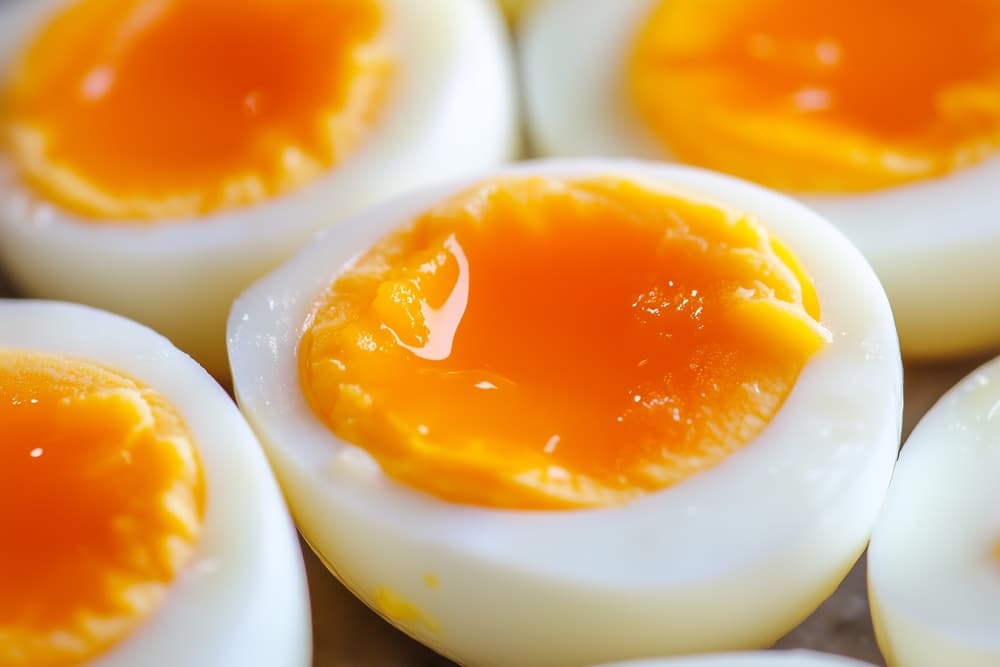
Understanding Protein Content in Eggs
2024-10-23
3 min read
Building muscle effectively relies on proper nutrition alongside a structured exercise regimen. The best muscle-building foods are typically high in protein while being low in saturated fat. Achieving optimal results requires a balanced diet that includes carbohydrates and healthy fats, which support overall performance and recovery.
Eggs are an excellent source of high-quality protein, crucial for muscle growth and recovery. They are rich in leucine, an amino acid that enhances protein synthesis. Additionally, eggs provide essential nutrients like phospholipids, omega-3 fatty acids, cholesterol, and vitamin D.
Salmon is not only delicious but also packed with nutrients. A 3-ounce serving offers about 17 grams of protein and a substantial amount of omega-3 fatty acids, which are vital for muscle health. Regular consumption of omega-3s may support muscle mass increases.
A staple for those looking to gain muscle, chicken breast delivers approximately 26.7 grams of protein per 3-ounce serving. It also provides B vitamins, which are important for energy production during workouts.
Greek yogurt is rich in both fast- and slow-digesting proteins, making it a versatile snack. With about double the protein of regular yogurt, it’s especially beneficial when consumed after exercise or before sleep.
Tuna is another protein-rich option, offering nearly 20 grams of protein in a 3-ounce serving. It's also high in B vitamins and omega-3s, making it an ideal choice for those looking to boost their muscle mass.
Lean cuts of beef are nutrient-dense, providing high-quality protein along with essential vitamins and minerals. Consuming lean beef can aid in increasing muscle mass during strength training.
Shrimp is nearly pure protein, with 19 grams in a 3-ounce serving. They are low in calories and fat, making them an excellent option for muscle building without excess calories.
Half a cup of cooked soybeans contains around 16 grams of protein and healthy fats. They are also rich in iron, which is crucial for muscle function and oxygen transport.
Cottage cheese is loaded with protein, particularly leucine, with one cup providing around 28 grams. Choosing low-fat versions can help manage calorie intake while still meeting protein needs.
Turkey breast is another excellent source of lean protein, offering approximately 26 grams per 3-ounce serving. It’s also low in fat, making it a great option for muscle gain.
This white fish packs around 23 grams of protein per fillet, along with beneficial vitamins and minerals that support overall health and energy levels.
Beans are versatile and rich in protein and fiber. A cup of cooked beans can provide about 15 grams of protein, alongside essential nutrients like magnesium and iron.
While focusing on whole foods is essential, protein supplements can help individuals meet their protein requirements, especially if they struggle to get enough through food alone.
Edamame, or immature soybeans, offer around 18 grams of protein per cup and are high in fiber and vitamins, making them a great addition to meals.
Quinoa is a whole grain that contains both protein and carbohydrates, providing about 8 grams of protein per cooked cup. It’s also rich in magnesium, which supports muscle function.
These seafood delights provide a lean source of protein, with around 17 grams per 3-ounce serving, and are low in calories, making them ideal for muscle gain.
Jerky is a convenient source of high-quality protein that can easily be incorporated into a busy lifestyle. Just be sure to choose low-fat options for optimal nutrition.
Chickpeas are not only a good source of protein but also provide complex carbohydrates, making them an excellent choice for a balanced muscle-building diet.
Peanuts offer a mix of protein and healthy fats. A serving contains about 7 grams of protein, making them a great snack for energy and muscle support.
This nutritious seed provides about 6 grams of protein per cooked cup and is also high in fiber, B vitamins, and minerals that support overall health.
Tofu is a fantastic plant-based protein option, containing about 10 grams of protein per serving. It’s also rich in calcium, which is vital for muscle function.
This lean cut of meat offers around 23 grams of protein with minimal fat. It can be a valuable part of a muscle-building diet.
Milk is a balanced source of protein, carbohydrates, and fats. Studies show that it can help promote lean muscle mass when combined with resistance training.
Almonds are high in protein and healthy fats, providing around 6 grams of protein per ounce. They are nutrient-rich but should be consumed in moderation due to their calorie density.
Bison is leaner than beef but still offers a similar protein content of about 22 grams per serving, making it a heart-healthy choice for muscle gain.
Although lower in protein, brown rice provides essential carbohydrates that fuel physical activity. It’s a great addition to any meal to support your training regimen.
To maximize muscle building, it’s wise to limit certain foods that can hinder progress. These include:
· Alcohol
· Ultra-processed foods
· Deep-fried options
· Refined carbohydrates
· Sugary drinks
A well-rounded diet rich in nutrient-dense foods is crucial for gaining muscle effectively. Incorporating a variety of high-protein options, along with carbohydrates and healthy fats, will support your muscle-building journey.
Additionally, consider supplementing your diet with wellness products like multivitamin gummies to ensure you're meeting all your nutritional needs, especially during intense training periods. By focusing on both nutrition and exercise, you can achieve your muscle-building goals efficiently.
Share this article: